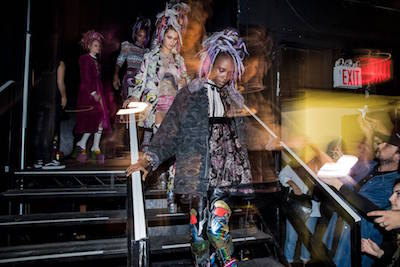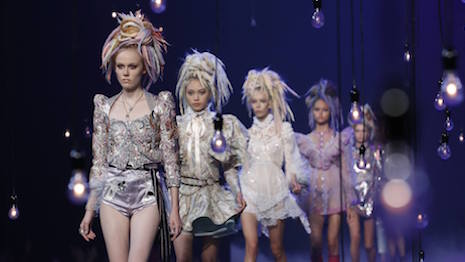Over the weekend, U.S. fashion designer Marc Jacobs responded to allegations of cultural appropriation after sending models down the runway sporting colorful, wool dreadlocks during New York Fashion Week.
His eponymous Marc Jacobs label presented its spring/summer 2017 collection on Thursday, Sept. 15 at New York concert venue Hammerstein Ballroom. The collection, said to be inspired by “Lana Wachowski, the ‘80s, raver culture, Boy George and Harajuku,” has angered many who have accused Mr. Jacobs of ripping off black culture.
Deadlocked from dreadlocks
For the presentation, which featured a model cast of various races, Marc Jacobs worked with hair stylist Guido Palau to create a “cyber” look. The dreads provided for the show were hand rolled and dyed by a Florida-based Etsy seller, DreadslocksbyJena.
The negative responses to the inclusion of traditionally black hairstyles escalated when Mr. Palau, when speaking of his inspiration for the hairstyle, did not cite Rastafarian culture as one of his many muses.

Models behind-the-scenes at Marc Jacobs' spring/summer 2017 show
Opinion pieces and Twitter banter fought for both sides of the argument, with one position saying Marc Jacobs is guilty of cultural appropriation because the models were not all black, that dreadlocks should not be commoditized or seen as a novelty and because he did not draw inspiration from the culture most commonly associated with the hairstyle.
The other side of the argument believes Marc Jacobs did nothing wrong, as hairstyles are not “owned” by one culture or another.
Adding fuel to the fire, Mr. Jacobs’ responded via Instagram that when a black woman straightens her hair, there is not the same amount of backlash and that he “does not see color,” comments that seemed to make matters worse for the designer.
Many viewed the designer’s comments to be tone deaf, causing Mr. Jacobs to respond for a second time. In his statement, Mr. Jacobs said he read all of the comments, and “apologize[s] for the lack of sensitivity unintentionally expressed by my brevity. I wholeheartedly believe in freedom of speech and freedom to express oneself through art, clothes, words, hair, music … EVERYTHING.”
The fashion industry has been accused on many occasions of being culturally insensitive.
For example, outerwear label Moncler apologized in July after a cartoon penguin character used in its products and marketing offended consumers.
Malfi, which is featured as part of Moncler’s collaboration with artistic duo FriendsWithYou, received criticism from consumers who felt its face too closely resembled that of blackface minstrel caricatures. Moncler apologized to consumers for any “distress,” but has not made any mention of changing its marketing or pulling products from stores (see story).
{"ct":"Sg\/oDq3NF67VhZKkMHkg71UXulFQl6Rig72Pc7MmEycoXVY9pI\/64mwr5Ojju5pJr5wByMfCphd2uzVDtXCBlR4Rs2fGDox9HEire1Y1G95ZVrPNYispB4ra9VG\/j+mZtxUUCZ+QfJggpF805K7myrEB4SWGQt4ZnHZBf1GO01\/VItJDKquM94GJ69iUWFg95X0hKeW1VSqmQDoCWCiuhyxZq2E52kpZ7vtkCUgf9N0r1Fn0P8yIRYEFfSDJ9DdqW7iIbauRdAy6u0zabqhzxwkZTTBEuFOgyq1P7KbGtEkYDfpmw\/mrxTYXVhtyH+WZUqLlJSPnq99U9qn2GfIJBQ4imj+9uJ\/tPj0bFXtD8pwPWf0eto0ZOIFAD4zOtu0k9opHLzpVj9h22dQ3XSx6fmLEh5WfOgNkE83HdnRLgMcYV4IuLanpEknFzlJHS1O012SG02N0\/DiMKnNI2PBTkzEj6bz4Akg2MSH9++TZFaIuS1IuICWanpXfgogMQjVPvZmxLIPhhor8e\/q7qBr5yMkxDgWdb9GcyIRuSDuQ0I4hXUSEal2jkueIgTt\/buJCKYsPTTxliixnwSlSR7xW5UX512+GVFln0jvRCZqddYw765VEvnQX0dTLnYMMXX85EcxN5JKuDftduGPwZsUyYMUH0Ij\/rA4NudVqEpOE++B8zg3\/uyat1WKJoeL15qPuHZtaDYA4qk\/DdmUyPZnZTlv2GK0sDMBg6T0VLrv8W0Tg5O34gzIcevz3oTZZekNXF\/4Mqonu6kajJzQ3xsGzMdalcSHBaDEpOGiZUR0FR7CO2UgtDvVDcBmcecsWZNu3NaDUF0oN2UQGIjc5ucycyFkjuJJkA0jGjRcVGcUT0IAm16D0n\/Szs2AawqQiA43WgAo\/YxLB+yHsFC+GxEFHcnvAIQt06wB5DHh0wqkv70S4lMGAvK45T3V9BZp5PWDAos4Zv4UFIbSh+3G18+26URERuEJKWQcLQwPLApfh2mp4JhmtPamYwjUfESv4wG\/b6MrZHhoVwpbL+du4sPeud+E+cudxLqXXNHh2K+lQV6db2TPBx4QwzjDfFbnZqltY30SY3XBBEx8jyEnqXtcqXRrdc+joddf1hD960C8ZWiOFYO9rk5jo+ECAFiP4UBeZaaC3WfPDGtblguLRRiZEo0Ch0HLU5MRORxKHKwdpjB0Sjq0JqvoblZOWFvl72c8HY8fTp4U7\/V9XwJtctwOQu9XtqfzaRhBA6beoZQ4qvhJvZ8PwXAwPodZF9zNlZxUyC1v6KSFK6hqKc\/+cmpSXqHyeiDZqPTeR3B8bE6GkTpZklzNYI1zOhrM1T1RaN\/ByDOtvXAXpHfWQ3Xv9zUc7UWarrqPFnQ2JNT\/rHZDYxletGOTi\/DnjVOoPjZk+hS1+SDIhg8WNi8qTg0Zi09\/cDvRL0dqgVl6g2xDsVWPwSSBpx\/K8AghSzP0Bar2b+LJ+fLCe\/bBTFl+zFa6oj7j76NGqEdye3n94KXjGsxCw6lteNej7ZHiNP2mvHOfa\/ALqlWjhKvni3xiFumwtTGRpMfDON70x1GaJxIjpXTE7yzt4sg6w+mKAqo4U3Lltr6SqQxnJp6XpYRXeD97LSvrJLwrdvcqBp+jEYPvr\/ijGAGdVcvWlqLo50dJ3xpLMc5dNq7pFC1vkMiZjVKs0yxy\/JZYtEEqFc\/EViqcMvK47o7yfnUBaSvLcMk15zv1RZavWoQe5UUAJLQeRvrfW7JtKfbnisjvMErT1RM3BwFRn94Sesb91G0\/ABl1bGezFgk1yqK70Lr2KaMKMPtEuLhoGJTp\/gzxHWSkzcsfsM8HtkJ\/OBiABFFOAK5vc32A7spUFXVHXJnmPGjxdrX16gSukPeWK7\/UFuUDsAQp1kv3zhMWCUKbv+h66ZZ2haLwPEMFWg1RyCed6N6rTm86zrKS73R3g5clvIOYLh5ndeCbuO0nMbNr\/w2Czoeit\/T+HxPbrtpJHoeIKMBkRFgZ5TjTJ6AUomKlnxa+xAZKm8RBYbm5aIXhvOExHetE8ItcRHmVTV77Crvl9FdVlctXzn8ychETyszk4m3KKOLran2GwgKuk\/EJOqVWHq+tiC+vEs56M\/FuF76X4Whp\/KLLjwKLWSJDCZWULiUqAc78LGzJgToi1JAykGL42mFrELDLMzjPFa7yUhRdsr+XPJDfvBZwcZAKTh34C0eZAVnkTYCkxjKGOTPdJ8aJP0ITQxmNvkVRyh9fi0\/\/HkMAAI1qINTRaLsuB\/tamaw8+Cjdb4r\/85Q2OYHUQfHT91LYSkh1+bbnlHMJr+FqSsJEmc2pxNeJFFKA3O1ndhKHLgXWme0mynHYSKpy8qeatqxl0DzTfenAyiCHAA0ADzWWFaH4LwDQLCfOqvupmbG74yXTapGWiNQM9aYZ9bQgNAbhQWWw\/7Gh3qNgH8NCwRFjDsAC6V03YJAVQsWtbZDQ4wq0FdQfEHuLHjFstCsiM53mHXcDGWiMiL5QNxL+gL1olwn\/8i24sOJHiwMAHUlhpXfYemMmOo1l7n92SkYD1tJwYWa9fkMZliNLJHrKH\/mWvVMB0vKUjeyzRkFgKPyjj4FuGykYUJE1PVfTdAzHrjOuXK+FQSXfpjeR+VWPO0fOZvgC00hVW6zqO5KRKaxEBbb8xYH\/ySpvNNLDzWXd9etiNwmD++uNGiGDLbS1khK4JKNPALaXvf517P1XWDbqrcdTsn\/9TRC6pINENKCJ8m+2fxgTQEeOoGxEaV0eU\/IdGWnASFqiRq7UjglCVaoQFV5HASF9h+OkE1CX4MPD1DGy0VvhFpvxsHD7uti\/fpz+tFzWmwMa6Hv7fP+RW1mqzSVAKpHbWIK1TVcT+QXH\/CSuDm4LQa2aNKJkNF+dAnH238TRgXlXb9lG3Qh8xI9hpCpct5Yv\/riwAwaf32WVtXqn9Ha733saG343rAAlKSW91T2vwS8EkU\/bzrVNd0+5jk1qwfRoXp7d\/lYZgmRf2o5B\/3XAD4p3rR57tinZDW7u0XfrLvcLTXFxh9q5DJcjQeCInlgxDb27XCoJAIHSWrPOrTu9hLynBUFDbiWdh2eYZXdwC43FtipiV8RbjWl2t\/KNFDBXpUzqXxjSu9qnBfDdP8ZkJpBwriPFFVBxqf5NyL+adlcK0\/vi89XOpMOIR3fXjBuDibDujyGEolOEjSlgPxw5JqHQ+MTMWMQtDKCcJeYg8HOuusn7EOTO5QG98P0CIKWvukinHhuY5W7X2iPY1NUQUn0yWb4wX1bDlV0c8DdP0yFsrFWxI3lt8\/kYZEni6kPXRBanKXpqblmWbztE98KTpeMSVd1gao3syhtWtWWz9Ji4ohhRud1qBXzs\/9DeHOoVPqsYJqgC1jgipuqVYlPqULahloQPu\/JLebxCiucxdjx+ubf2qRt0lk186neyaoGwCw0lcI+hN7huG54tKSqYAV0shiAhVipXWiySVrqd8tZm9xOKhrM6hkvCtHEuBBuviMLignC\/pmswl0BWE2Z6B+UbN1SjM7DVU\/SAd+mLZld\/zuEn5FhWbgfzrFzX4fkrTBuJG3yuJmpr2rkqGnXaBP4rruIBEzxPwPJfrm7lpEXTR9RHPpsHaZYGAf1JgSpJqlYZd66pTNYTGLOCyyZWM+GmMJeyU3hYsw1CR8pmt9yuRG4atYjnzmP4rsHv3ByOZEzp3Gx94AxyJNQhhs5ER4Bgl4Ho9Vxr\/qUpwlfRb4FUevUCSyKQK+0K20VXw4m0nz1jAt4iExXg8d8CP8BHQFkQyQCCJTSBI4nlWrHW+LT7fm9BkEOjEOUuoXK1Rwgi\/\/tPmmZHbGp1LeyFrXQ2k4mUcMByzhIPzvVDISzd9Ga5wdZ0OGl9nX76mmcYDNJBuYbGIK9G8HKmexR3lypThPH2MqO8SdNW8j04YJMESCkFWT+33WUfd8xEYQCWF8rd6gCxfHzEneBfgR3+dU31lnAOQgNflSMPz1av3OGkLhzvW15AP2Fk4gOqAtCaJwQJcn46j3RyV2Y5ZXERtWaGyJJ8gTehSmFXYVwjuv87UYhGcDxRssag8iqg09PUBhrBlyWJoktvexyUpVoj4yUlzvAdZXxO3Dt3LvUBiR0ANSijcGyvvW0T\/sSl5I6EmkI52wwGySGaBhxoBA5ZpMEl7OEfoZZRBs+V8VyMbectT91120eCC6fvopxTL+fO76kPkzWgcF8Us7j98YEk4HOELjKf1VxUS0dDEu9ya+WSE3HQfx8Mv\/YwDRpB6fwsN8TVsGSbhVTCC9JxK9PoRI37PYpqw\/7Mgl48yJjl3VICnbz60PNUB2gwXYbZ1NJ8HmQTCK6VjP+B4DIm4u0Zl52D\/8E2sYRYUy1OUHjrIXsrsCVqbSNBLfjF49WPghw8VsGdWnUGvYvkm9C6wKuLhQxT2trQHbHL5MvUoKKol2aVR\/vLrpGbKK1D7SQG6Y10F1JPiA46wlPZGkQHeU3SW3mDX62Ijaxz\/S7X0QhpNnXQic\/1vg6qm\/wcEWSHK1N1PgPy2bGWnetpOsUFqQaBUddsydtPrtnyA6RGERgtRJ26O36BbxBHSjQHeZAgOI3m\/F7Rjp0cIMhty15jBYlMhcK+nkVZmTkNaUDG7CV4ehDYkCknB4LfuVPoMeNw643EVM4IMWU1mzGaEICdbVayhcYQGDDdnK6ZGg+1BsLNbirdH8OSF+91BBnGlgQLpCqnGlmSmDyTiPlaeQk3\/xOxG\/d6z6kgRnZgcUAliJMYJFKLg7RGBX4J6sjyH6hgkzccRbC9F1DepAhPbhkORQlHT6mV6JIqAev3lBUMZDWJah3ip96KXASLE3OK2b6V8XkmgpSl4Mkkkb0tJBQqqQ1UAXCEvGIQLVZHtfcnkkIOtQTpWaXX5dZg9R3hvgrf899Mgy1jFKHeYR2\/xDNs2zdXdlKDUAZ7wkytbJIAAEQOSOwuC+EOTkDZOWtOvGZxK9wk0TlYF6bbnbyyfjKbYt1uVh+9gO2PY+D3JuPLSV+9hwmvamRViCe2aVFyMCq4kWtwT5Zh6AyDx6OSXZSh9LkidWxqJrCo2oUEupDofWGUwGsqy9HReqt25b+f5nASV82QtcriPn5mLZSegXlBaMzJWIFSdjBZTJ5awIE5U2GoEtCSGOKXfMWPRh8l7+Y8qUOb2\/\/sGFKC4YxgvL0nKVxI8brVVORII57HGw46eTSB5oA5nOXMjkWvIXmu7YT8bp4ASs\/ymngAnnymWRAZ0GGemnfRxIA8laSpD35dRuxgiz7sjDQo2jcb7sp3lnummAtujy3nbHkuF8IB5B9uXcZOVrqnpLwJhpbJjBUZVFMSdFoLt0n4Jyz2UatbDGTG6b1R1SHjyOa15Cej8xMNAQUoLHMZ\/ld2FRTtFzPAJtKJ3AZnIJJUtHGmw33HXPArEBb2ch+ONNYyrNAd+yRuTV5KTZKy2MS0b6obkm2scJ58A6GhzWwaW+e05NH485L1fxdfySe6i7P3JlW+dQe3fsuyXPDzGT7b\/D8UxaDmBSQ7nzc6ZnPgIyZJHAmzzhrheEXScQjMaUW3lWx1zjH3TLuGHWKfsBxlvDNtBrEvye9qvDAiEv908rl6aLUyS7zcSlZ+wlDREC0OKyrzB1dNrDhHSL04qdV7\/q6IUWEas2p8W9HPBl8VpvcIt+ymlKIgf7jRvaCd4E36oOIqRrk7l4dEhYN63KVrTix7f14Bq9ttlJJL2YcX9g\/3ddoO\/dHkksqLqHiRxT7sniFNgUeMD09xQ5bFDm8AswIwTHA3ljrf8IVAgvrImmaDKkeFjWpm8mXi5OUHAowhRMyblbaeLM4JQaPpBpUWEq4LvU83laIQP6wQBo4rGk10Ti6ZXzEiGthTuspMKt7TvcJG2CP\/AYJhVnv\/w5Ag7bAyNZMOhSFjQC68N7iFicVRDK4DfL3p6DA8B9nj2zFESuWCMpEbIIVCK0moc4c+V9RDv\/U17qH44raqz0ENarDinla87oUeyz6ByfWoe\/GwM+eV\/0QS1QNqNKhjt3vlkuSgo4tB9U3SPhM+ab4kNpn8AQ5xeYeJUL0ylpp5P7SOLmy53v0pOmzK1c7UUb3PBqemPRxJpJyMpzQ7rvyPGJTRh4I6fyslMYQ71WIpvxbKglAkOuUJ7oODe6xVRZ+g1Vxrb1Xvs74kTgTdsJ77mgEcUKGVqAMi7Qg+sXWFkyJb7y275qSM1OGZ09JZzL1NdgUR\/VwFdVEnZftOKF2TZW\/NReuZpRxeLYLtV\/tZb\/dZFind+4Sv72DwaczBrZmKNk60mg\/vZ8rQkH1tOMwGJ8xtLJv9rlTYbdOgL3G558aVcF21QOpNJNqSc16RLeXQ4PyRmMP4v4xxNyYEXRiq5sorxAkvtCZHf\/LZzRWrl5QWlbJx4sWOvblU\/KOUHdReY9FXAWy9EzkNTW1HvcHCH2ramPGz8PU6VOBXt5CIAJDAxKD8V6qXFDU0g+TRstZ\/P0SfjmavSgDAdDBflgtHZbSoQXQoJ2BbJvfK8\/TeVZSYRw6em7RfmYDc2+rGj3dkUG43q9Ygxc8sQRv\/qOCCH3w==","iv":"04f74c426290cdb0bb4153f51328b87b","s":"f598dfb618a3b55c"}

 Marc Jacobs' spring/summer 2017 runway presentation
Marc Jacobs' spring/summer 2017 runway presentation